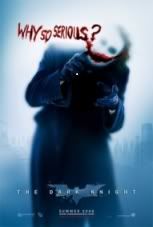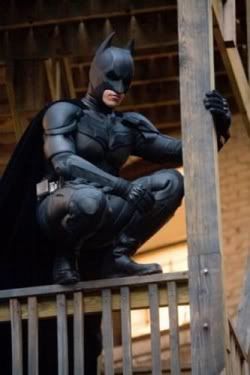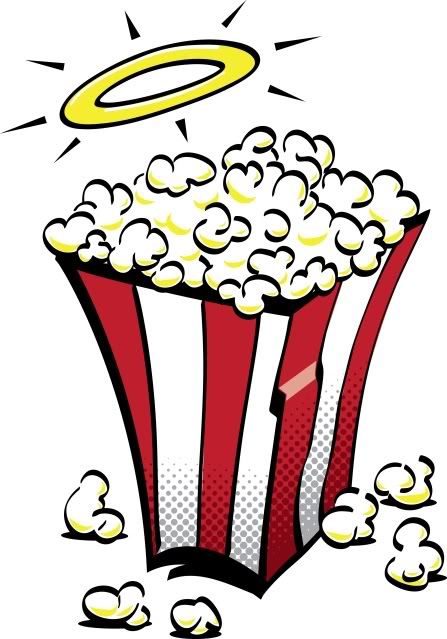
July 22, 2008
The Dark Knight (2008)
Should I see it?
If you're a sycophantic, comic fanboy: yes.
If you like big, loud, flashy, but hollow things: yes.
If you're into well structured, good movies: no.
If you like big, loud, flashy, but hollow things: yes.
If you're into well structured, good movies: no.
Short Review: Its a movie about the fall of Harry Dent, his aspirations, his moral courage and his collapse into madness...oh yeah, Batman and The Joker fight in the background.

Disappointment. That's the word that swims through my head when I think of this film. I have disappointment over the opportunity that was missed. What should have been a tale of chaos versus order, good versus evil, winds up being a unfocused yarn that tries way too hard.
Disregard the gleeful, fanboys wetting their trunks claiming this is the best film ever. This simply is not as great as people desperately want it to be.
Amazingly, this film has little to do with the battle between The Joker (Heath Ledger) and Batman (Christian Bale) and has everything to do with Harvey Dent (Aaron Eckhart). Structurally speaking, Dent is the hero of the film and a tragic hero at that. Batman himself is a bystander in his own story. He doesn't drive or control any aspect of the narrative. His choices do not bring about the climax. These things fall to Dent, who, if this thing was written properly, would have been a supporting member until the final moments. Dent's fall from political hero to the evil Two-Face should have been saved to set up the next film. As it is, he acts as Batman's stand-in for the whole movie.
The real shame comes with the handling of The Joker. First, he simply does not have enough screen time. Writer/Director Christopher Nolan (Batman Begins) has to spend so much time developing Dent that he has to sacrifice displaying The Joker. The result is the acclaimed performance by the late Heath Ledger is choppy and incomplete. The conflict between Batman and his eternal nemesis is well known to the audience and little development would be needed to get to the meaty parts of the story. Nolan, if he would have keep himself in check, could have given The Joker his due and allowed him to revel in his trickster glory. Instead, Ledger's rendition feels forced at times with his jerky speech patterns and stabbing tongue.
Opposite Ledger, Christian Bale's Batman seems like a faded copy of his former self. With nothing to do but watch those around him, this outing leaves the caped crusader sulking in the shadows. Reduced to little more than a gruff voiced prop.
Nolan's problem is the same one that tanked Sam Raimi's Spider-Man 3. Having multiple villains, multiple stories, and multiple themes is like tying three baskets to the bottom of a hot air balloon and expecting it to fly. A story needs to have a singular point supported by related themes and represented by a lone conflict between an individual hero and villain. It would be nice if multi-arced stories worked, but they don't. This is the way of the world. Nolan exhausts all his time chasing down his narratives ans can't move his story forward.
Beyond the multifaceted plots, Nolan weighs the film down with obtuse references to the War on Terror™. IEDs, the burning 9/11-esque wreckage, hostage videos, concerns over spying and on and on the references come. These references have a place in the film but the film is so crammed with other competing points that they aren't fully explored and only provide rude nudges to the audience.
Ridiculously, Nolan has been telling the press that the political overtones to the film are essentially unintentional:
"To be honest with you, in the writing of the films we try not to be too conscious of any political parallels or any thing that we might want to include from the real world because I think the terms of the storytelling demand that you be a step removed from today's political environment." - Christopher Nolan, Director Christopher Nolan on The Dark Knight, Crave Online.com
It's fine if he wants to make these arguments, but please have the manhood to stand next to your own work. The problem here is that his War on Terror™ branch is wedged in and obscures the real reason for the film - to watch Batman and The Joker kick each other's back-ends across Gotham.
Overall, this is a flashy movie that is good enough to entertain. The same can be said of many films. Most people will probably find it worth their while. My stance is that it could have been a thousand times better and Nolan dropped the ball. This is not a great film. It is not even a great superhero movie. Sure it is big and it is flashy, but in the end it's nothing special.
Click on Bat Mope to view the trailer

Click here to buy your copy of
You Are What You See and learn
to change the world from your couch
Labels: Aaron Eckhart, Batman, Christian Bale, Christopher Nolan, film, Gary Oldman, Heath Ledger, Maggie Gyllenhaal, Michael Caine, Morgan Freeman, movie review, superhero
Share
Previous Posts




Good News Film Reviews LLC 2004-2010 - used with permission
Images, video and titles are the property of their respective copyright holders. Good News Film Reviews LLC claims no ownership or connection to them.
The views expressed on this site are not the opinion of any advertiser or external entity.
While we take care to only link to responsible entities, Good News Film Reviews LLC takes no responsibility for the content linked from this site. There are sharks in the waters. Surf at your own risk.
The Template is generated via PsycHo and is Licensed.





















12 Comments:
I quite agree with you about the multi-arc stories. While I regard the first two Spidey movies as triumphant, regardless, the third really suffered from what hints at becoming a genre convention of comic-book movies.
Which, on the whole, I am firmly conviced are one of the only category of movie to BENEFIT from the CG-heavy, recycled-plot epoch.
I'll point out, though, that one reason long-time Batman readers and aficianados (ahem, "fanboys") might not be put off by it so much in this case is simple: we are used to Batman being held constant in his own stories; we know the character well and are comfortable with him behaving according to type; we are often curious about Bruce Wayne's life; and--especially--
We are used to seeing Batman's arch-foes, particularly the Joker and Harvey Dent, used as psychomachia for the Batman himself.
This story structure is absorbing and perennial: Batman, a larger-than life figure created in response to common street crime, simply cannot be shown in endless combat against thugs who are no match for him. The necessities of storytelling compel us to dream up deathless antagonists, which in turn invite the question (within the story): If there were no Batman, would there be no Joker?
It's one of the classic "doubling" plots, up there really with Shelley's Frankenstein; so those who're accustomed to this story line may well not regret more of Batman whaling on Joker (Joker is a schemer and a survivor, not a combatant). And we may think Harvey Dent is the perfect place to center such a plot, as the only one whose *change* is really interesting.
Who wants Batman to change? Not I.
Batman must change - all heroes change in the movement through their stories. This is what the story actually is. The heroic character works through a conflict/question and finds resolution in the final moments where the villain is dispatched. This doesn't mean the hero is altered to the point where he becomes a completely different person (although this happens from time to time) what it means is that he learns a lesson that makes him more heroic - this would be the moral of the story.
In this case, the supplanting of Dent for Batman detracts from the classic story structure and reduces not only Batman but also The Joker.
You're right, The Joker is a survivor and not a combatant but few villains are. This is why they retain secondary antagonists to do their bidding. Gran Moff Tarkin and the Emperor kept Darth Vader around for specifically this reason, as an example.
The fact that a secondary character's arc is more compelling that what is happening to the hero stands as evidence this story was mishandled.
I haven't seen the movie yet so am saving all the reviews until I have, probably next week ... yours is one of the few negative ones.
Usually, I see more of this sort:
http://lookingcloser.wordpress.com/2008/07/23/yes-thomas-hibbs-gets-the-dark-knight/
What do you respond to those reviewers?
I honestly think the reviewers are giving too much credit to the movie. Yes, The Joker is a great trickster character and stands as a good example of nihilistic thinking in most respects. He's not the most evil thing out there. I'd place someone like Aaron the Moor to be worse - The Joker doesn't value good or evil, he doesn't experience them, he's a sociopath. Aaron identifies the difference and intentionally chooses evil. That is far more villainous.
Because of the structure of the film the audience is robbed of seeing as much of The Joker as they should and his soliloquies in the end do expose some of his internal workings but not enough to cement his character. These monologues are there in the first place because there wasn't time spent in the film to express these ideas in his actions, or in his dialog. The character of the Joker is shoved off to the last second, he gives eloquent but rushed explanations of himself and is then destroyed.
I guess I'd say to the other critics, stop hyperventilating and get a grip - bad writing is bad writing. Again, this isn't a horrible film, its just a mediocre one when it should have been as good as critics claim.
Aha ... I am even more curious to see it now. Thanks Scott!
Proofing the lagniappe now, btw ... it should go up soon.
Hey, I told you so. I heartily concur. Two intersecting story arcs is a hard thing to pull off. This movie failed to pull it off.
Scott, you're demanding that a heroic protagonist be either the protagonist of a comedy or the tragic hero. Heroes, however, do not necessarily need to grow. The problem may be ours, not theirs; they may solve it by uncovering, not discovering, their resources. The interesting problem to me is the incapacity of our "therapeutic society" to accept any hero who isn't also an AA member....
I like your comment about the difference between sinfulness and sociopathy. Whatever the real practical and theological challenges, the idea of "radical evil" has conflated the two, and the "therapeutic society" has defined one out of existence--the sociopath in theatre is a rare marker of real sinfulness, and the clinical terminology an all-too-human avoidance of the real subject.
This is why Hannibal Lecter stands as one of the rare, great achievements of American fiction, the apotheosis and utter failure of therapy and consumption....a very Moloch of Yankee ingenuity.
All protagonists are heroes. Almost all heroes are transformed. The only exception is when the whole point is that he doesn't change (and is a tragic figure in light of his stagnation). Heroes need to grow to be heroic - it is the function of his role. A hero who does not change is simply not heroic. Name me some protagonist who do not change - not one bit, and are perceived as being good and heroic in the end.
You're right about our heroes being AA members - I would put this to our culture completely. Hamlet was written a ways back. I would say that our heroes are more consistently mopey and conflicted. It seems that culture only takes someone seriously if they're troubled like a teenage girl who was stood up on prom night. Batman is a great example of this - another example is James Blonde. We've traded in hyper masculine, uber heroes for metrosexual crybabies.
Ajax (though he dies in combat)
Hector (he dies, but not from a flaw)
(among others from Iliad)
Odysseus
Beowulf (he succeeds, but doesn't change)
Superman (before the 90s ruined him)
...what you're doing is confusing the story of the MAKING of the hero, which is one kind of story with a hero. The "education of the prince" is the funnest kind, and most often done, for sure.
This is because a mature hero that we easily believe in must either be tragically flawed (hence a tragic hero--Titus Andronicus or Oedipus) or faced with a challenge which throws him back into "education" in order to surpass it (Benedick in Much Ado) and become a comic hero (not necessarily a funny one, just one that wins and gets the girl 'cuz he figgered it out).
We don't easily believe in a mature hero who defeats the enemy because a hero is by definition BEYOND us, specially favored and able to do what we CANNOT. To see the hero as hero, he must be removed from our ken; to see the hero in comparison to us, he must not be completely uncanny to us. Our envy, and especially in our culture our egalitarian instinct, make us desire/conspire to pull our heroes down to our level, to saddle them with our problems, internal conflicts, "meanings," when all they want to do--AS heroes--is fight our battles for us with hateful, loathsome enemies (who do not have to be their mirror images).
Our pathological inability to have loathsome enemies hurts us here, too.
All of the above is why The Incredibles was such a great movie, BTW.
But all of the above make me less likely to demand that my heroes GROW, essentially. Indeed, I would like nothing so much as to have a movie sell me entirely on my need, as a human mortal seeing the movie through viewer-surrogate eyes, of the hero whose divinely-assured success seems inevitable when we've seen it, but impossible until then, though he himself had no call to doubt it--hard to sell? yes.
But only because we're sinners trying to be "well-adjusted" to our damned world.
I think this review completely misses a few key points:
1) The Joker is presented as an absolute. There is no genesis to him. No fall of Satan story. The Joker is evil through and through. Not only does he understand good and evil but he purposely chooses evil b/c he reasons "Their morals, their code, its a bad joke. Dropped at the first sign of trouble" Nolan compared the Joker to the shark in Jaws. He cuts in and out of the film wreaking havoc and destruction. He's unpredictable and unexpected. There's no opportunity for the audience to sympathize with this person or understand what motivates him.
2) Batman was fully developed in Batman Begins. The Dark Knight moves forward with the story. We got the fact that the murder of his parents and his phobia of bats lead to his adoption of the Batman persona. Instead of dwelling on Batman himself, it examines the relationships of those around Batman and how they interact and are affected by him.
3) Nolan isn't making a political statement. He's examining broader issues like good and evil, right and wrong. Since the world he's created is a realistic one that emulates our own world it follows that expressing these themes through events that take place within the story will immediately be comparable to events that take place around us. This doesn't necessarily mean the film is a political statement. I think the reviewer is uncomfortable with the fact that the series of events in Dark Knight are clearly presented as good and evil whereas similar events in our world are reasoned away with moral relativism, political correctness, etc. There is no opportunity to dismiss the movie as "Oh the film is just making a political statement." Its a raw translation of good and evil using events that reflect our own world and this clearly upsets the reviewer b/c there's no chance for him to excuse it as a "political statement."
4) Finally, Nolan admitted that Harvey Dent is the backbone of this film. I don't understand the author's hostility towards this fact. He's compelling b/c of his tragic fall from grace whereas the Joker is an absolute. The former provides a pallet for a richer story but the later is limited by its one-sidedness. Even still the writers did an admirable job giving such a one-sided figure as the Joker depth through his corrupting philosophy and intelligent cunning. The title of the film isn't "Batman v. Joker" and the purpose of the Joker card in the final scene of Batman Begins was to illustrate Gordon's point about escalation not set up a sequel that would be exclusively about Batman and the Joker. It seems the reviewer here feels deceived about the Joker's role in this film when no promises were ever made.
Totally agree. This movie is horrible, and I struggled to stay seated the whole time. Had I not with friends, I would had walked out within the first 50 minutes.
Post a Comment
<< Home